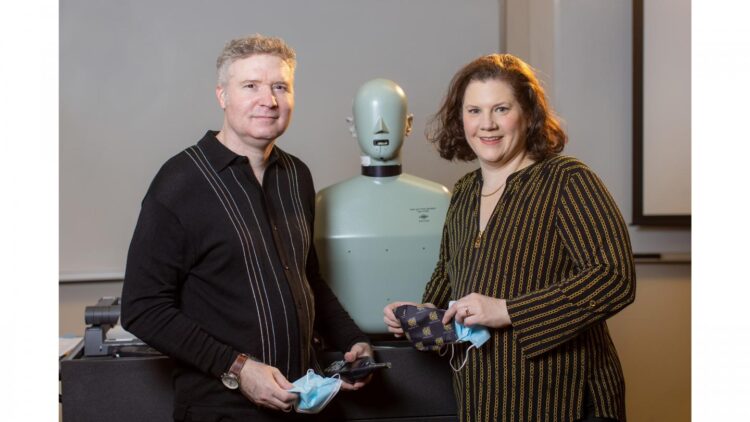Though masks are necessary for curbing the effects of the coronavirus pandemic, their impacts on teachers’ speech intelligibility may affect students’ learning
MELVILLE, N.Y., June 8, 2021 — As face coverings have become more and more ubiquitous during the coronavirus pandemic, their effects on nearly every aspect of life have been called into question. For one, a better understanding of the impacts of face masks and shields on acoustic transmission in classrooms could help optimize educational settings.
During the 180th Meeting of the Acoustical Society of America, which will be held virtually June 8-10, Laura and Rich Ruhala, from Kennesaw State University, will talk about how various types of face coverings may affect students’ understanding of their teacher. Their presentation, “Acoustical transmission of face coverings used to reduce coronavirus transmission in a classroom environment,” will take place Tuesday, June 8, at 10:50 a.m. Eastern U.S.
Using a simulator to generate artificial sounds within the frequency range of human speech, the researchers compared sound levels throughout a classroom with 12 different face coverings, including masks, shields, and gaiters. Though some coverings led to more intelligible speech than others, this typically corresponded to a decrease in effectiveness against virus transmission.
“We found that some masks performed well in the acoustic testing, such as a thin gaiter-style mask, but poorly when compared to reported droplet transmission rates,” said Laura Ruhala. “Others were the opposite — good in droplet transmission rates, but not as good with the acoustic testing — such as the N95 and KN95 masks.”
Common across all different face covering types, the researchers noticed a drop-off in speech intelligibility as students moved farther away from the teacher. Surprisingly, adding a face shield or clear plastic mask amplified the teacher’s voice at certain frequencies, but with a trade-off of even larger reduction than cloth masks at other frequencies.
So far, the simulator has only been used to create white noise, though it is capable of much more. The group hopes to further their understanding of classroom speech intelligibility using more realistic sound signals.
“Next, we plan to evaluate data collected with artificial and American English male and female speech signals with the same equipment,” said Richard Ruhala.
###
MORE MEETING INFORMATION
USEFUL LINKS
Main meeting website: https:/
Technical program: https:/
Press Room: http://acoustics.
WORLDWIDE PRESS ROOM
In the coming weeks, ASA’s Worldwide Press Room will be updated with additional tips on dozens of newsworthy stories and lay language papers, which are summaries of presentations written by scientists for a general audience and accompanied by photos, audio and video. You can visit the site during the meeting at http://acoustics.
PRESS REGISTRATION FOR MEETING SESSIONS
We will grant free registration for credentialed and professional freelance journalists who wish to attend the meeting sessions. If you are a reporter and would like to attend, contact the AIP Media Line at [email protected]. We can also help with setting up interviews and obtaining images, sound clips or background information.
VIRTUAL MEDIA BRIEFINGS
ABOUT THE ACOUSTICAL SOCIETY OF AMERICA
The Acoustical Society of America (ASA) is the premier international scientific society in acoustics devoted to the science and technology of sound. Its 7,000 members worldwide represent a broad spectrum of the study of acoustics. ASA publications include The Journal of the Acoustical Society of America (the world’s leading journal on acoustics), Acoustics Today magazine, books, and standards on acoustics. The society also holds two major scientific meetings each year. For more information about ASA, visit our website at http://www.
Media Contact
Larry Frum
[email protected]





